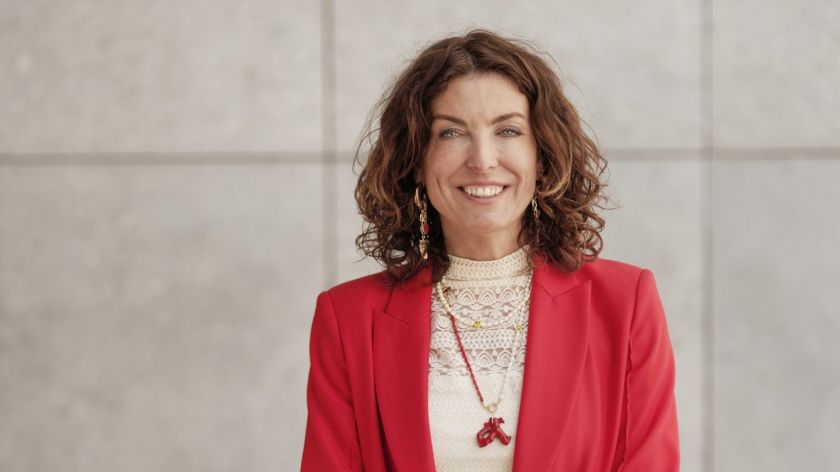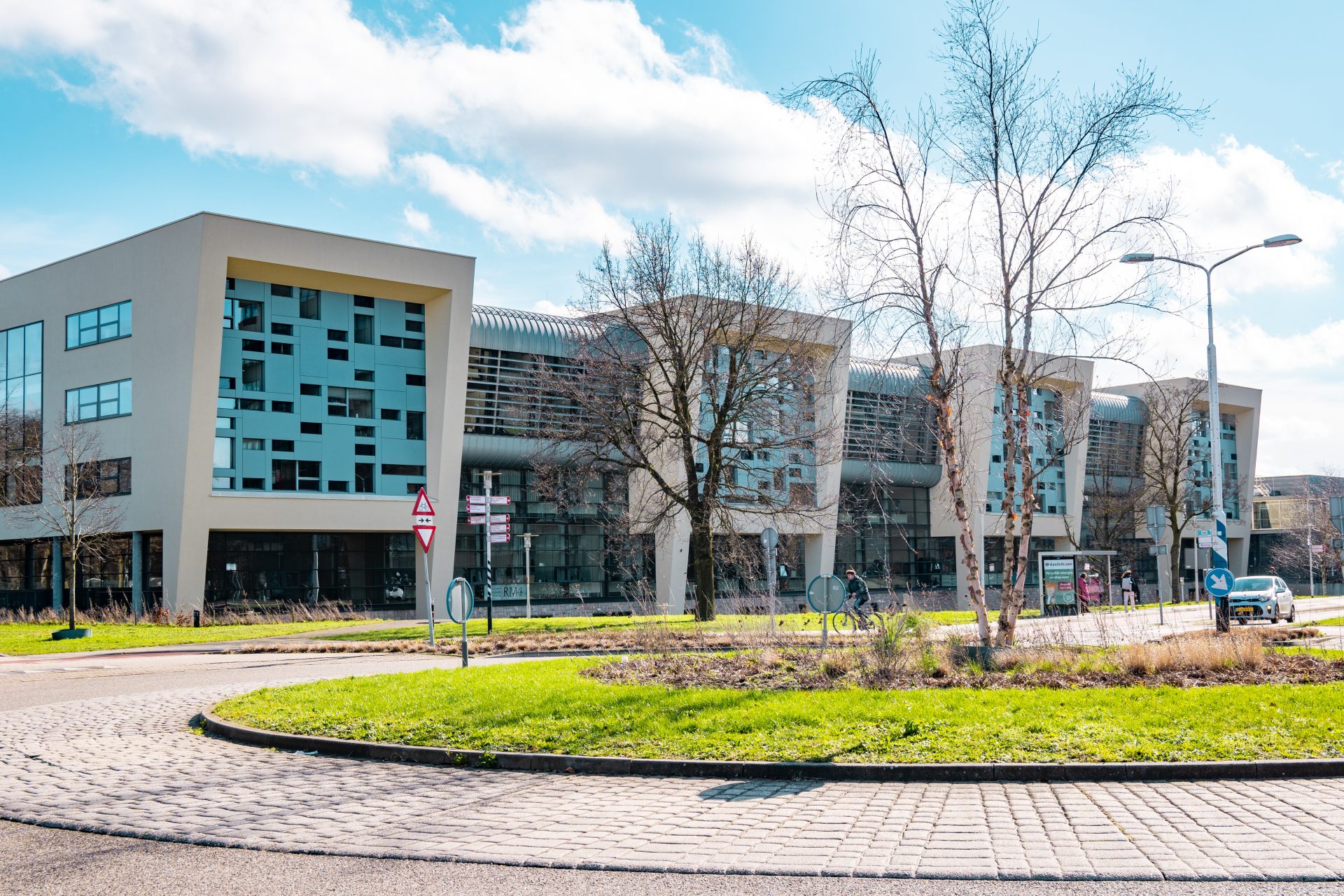New dean of management faculty: ‘Our aim is to prevent a reorganization’
-
 Saskia Lavrijssen. Foto: Frank Ruiter/Lumen
Saskia Lavrijssen. Foto: Frank Ruiter/Lumen
Saskia Lavrijssen has been given the task of navigating the Nijmegen School of Management into calmer waters. With a multimillion-euro deficit, a crisis of confidence, and a storm of negative publicity, the new dean faces quite a challenge. How does she intend to handle this?
Three weeks ago, the evening before her first day as dean, Saskia Lavrijssen was at a restaurant with friends. During dinner, she received a message forwarded from De Gelderlander. “Radboud University intimidates staff and advises PhD candidates not to get pregnant,” she read on her phone.
Last September, a multimillion-euro deficit came to light within the Nijmegen School of Management. As if that wasn’t enough, a breach of trust arose between the Faculty Representative Council (FOC) and the faculty board; the FOC withdrew its trust in the FB. To top it off, there was the union’s letter of concern about discrimination and intimidation in the workplace, on which De Gelderlander based its report.
No, Lavrijssen didn’t step into an easy situation when she started as dean on March 1st.
‘My first few working days were challenging and intense,’ she says in her modest office on the third floor of the Elinor Ostrom building. ‘I immediately started working hard. All the developments put me on edge and made me want to make changes. But since taking office, I’ve also had many wonderful conversations with scientists and staff from the support services who are passionate about education and research. Last week, I attended the university teaching award ceremony for Nanne Migchels, a lecturer from our faculty. That energizes me.’
Did you know what you were getting into when you applied for the position?
‘I was briefed on the challenges. They were primarily financial, but I was also made aware of other problems. I’ve been working at universities for a long time; some things are familiar to me.’
‘It is good to learn from the past’
‘Look, currently we are going through a difficult period. People are uncertain. That’s when you need to offer a listening ear and seek connection. This is the moment to make good choices about how to proceed. We need to scrutinize the attractiveness and distinctiveness of the educational offerings, as well as interdisciplinary collaboration, appointment and promotion policies, Recognition and Appreciation, and promoting social safety.’
You had your first meeting with the Participational Bodies last week. What was that like?
‘I am very pleased with the constructive questions that were asked; I hope we can continue on that path. We need to restore trust, which can only happen step by step.’
A mediation process is being initiated to repair the relationship between management and the FOC. Isn’t it odd for you to enter into that process when you were not part of the conflict when it arose?
‘Regardless, it is good to learn from the past. This conflict is not just something of the past six months; the participational bodies have felt unheard for a long time. We would like to improve on that in the future. How do we want to collaborate? What are the roles and perspectives? How can we sustainably shape collaboration in the future?’
The current vice-deans were part of the faculty board in which the unit committee withdrew its trust.
‘They have also been confronted with the perfect storm caused by this crisis. They are willing to look back and forward and want to restore trust. Since both Jolle (Landman, director of operations) and I are new, we need their knowledge and expertise. It’s also good for the participational bodiesto talk to them, to learn why things went wrong and how to prevent them in the future.’
Last September, a package of crisis measures was implemented, such as a hiring freeze and limited external hiring options. How long will these measures continue?
‘At least until 2024. This spring, we will reassess the situation. The financial situation has been analyzed. Now we are visiting all departments to provide explanations. The idea is to quickly take measures that can generate additional income.’
How do you plan to do that?
‘For example, by looking at how we can shape education more intelligently, or how we can do more research through the second and third streams of funding (externally funded research, eds.). Is everything we are doing now sufficient for our strategy and finances? Can we develop new projects? Launch new postgraduate programs on the market? Are we doing things where we are losing money, or are we offering courses that no students attend? We want to include this in the budget for 2025 and beyond, hopefully allowing us to lift the crisis measures.’

Is the directive from the Executive Board still in place to eliminate the deficits by 2027?
‘Yes, that is indeed the directive. The Executive Board will compensate for the losses until then. We have been given a number of years to implement those measures. We are now working hard on that.’
Is it possible to eliminate the deficits without compromising the quality of education and research?
‘I am convinced that it is. Today, I heard an example of a department that has two fewer full-time employees for its bachelor and master programs. They have taken a close look at the intensity of assessments throughout the program. They were too burdensome for both students and teachers, and they did not add any value. So, there are adjustments that can be made to make the program more manageable without compromising the quality of education. This kind of crisis also provides an opportunity to thoroughly review processes.’
Won’t that have negative consequences for workload?
‘That is a valid point: the workload must remain manageable. We need to monitor this for all employees. For example, if people have a lot of teaching duties, the consequence may be that they temporarily do less research.’
We hear that several people have already left the faculty, for example, because they did not receive the promotion that was promised. Moreover, because of the hiring freeze, they cannot be replaced.
‘That is very regrettable to hear. The feeling of uncertainty is very unpleasant. We need to have discussions about this and investigate the causes.’
‘People coming and going in the academic world is of course part of it: I have worked at several universities myself, and it has also brought me a lot. But I can imagine that people are more likely to leave in this situation. If those people are not replaced, there will come a point when limits are reached. Then we need to figure out how to handle that. If the workload in a department becomes too high, we will certainly discuss possible solutions.’
‘In the past, promotions have been promised too often’
‘A new appointment and promotion policy, which can offer employees perspective, has top priority. Recognition and appreciation must be part of it, so that people who, for example, provide a lot of teaching also have development opportunities. This is part of the broader Recognition and Appreciation policy that we are implementing within the faculty.’
Don’t you find yourselves backed into a corner in this regard? If there is no money, employees cannot be promoted either.
‘There needs to be a clear procedure. In the past, promotions have been promised too often. That’s not wise because circumstances can change, as has happened here. This results in people becoming angry or frustrated. Of course, we want to retain talents, but if those opportunities are not available with us, they may be elsewhere.’
Is a reorganization in the faculty still out of the question?
‘Making sharper and smarter choices forms a good basis for preventing a reorganization, which is our aim. The idea is that from 2025 onwards, we not only save money but also generate additional income. At the same time, we don’t know what the future holds. We don’t know what measures will be taken to restrict internationalization, how many students we will attract, or if there will be any sector plans or starter- and incentive grants.’
The Executive Board will absorb the faculty’s losses in the coming years, but is that sufficient? Shouldn’t the board do more, given the impact of the crisis measures on the well-being of employees?
‘We need to come up with a good plan now. That’s how it works: first show what you are doing, what you can do, and what you have thought of, and then implement it. If things really can’t go on, then we’ll sound the alarm.’
What are your priorities for the coming months?
‘Restoring peace. Seeking connection. Providing clarity about the financial situation, the processes, and establishing long-term measures. Ultimately, we want to permanently get the financial situation under control.’
How do you plan to restore peace?
‘By being present a lot; my door is always open. It also starts with listening to the various segments within the faculty. And ultimately, by creating new policy plans together.’
One of the criticisms of the previous faculty board was that too little use was made of employee expertise .
‘We are happy to make use of that expertise. Everyone is welcome to join one of our working groups. We, as the board, are responsible for bringing together all input and reaching good decision-making.’
Why did you want to take on the role of dean?
‘I have seen the beautiful aspects of the academic world, but also the less beautiful aspects. Like many people, I have a passion for education and research, but I believe that collectively, we can also make universities a more pleasant place. Smaller workload, more recognition and appreciation, more social safety. These are themes where, as dean, you can achieve something.’
‘People who dedicate themselves day and night to students deserve more perspective.’
‘I believe that people who dedicate themselves day and night to students deserve more perspective. If we utilize and appreciate those talents, we can achieve much more together.’
What challenges have you faced in the past?
‘Everything you read in the newspapers about all universities: I have experienced all those kinds of situations.’
Would you like to elaborate on that?
‘No. But I can say that it has strengthened my motivation to initiate changes.’
In what areas, for example, do you want to implement changes?
‘In recent years, much attention has been paid to diversity, equality, and equity, but we’re not there yet. There are a lot of unwritten rules at universities that we need to get rid of. For example, the expectation that if you’re an assistant professor, you should become an associate professor within six years, and another six years later, a full professor. That’s not healthy. Many assistant and associate professors start a family. People can also fall ill or become caregivers. If someone works less for a period during their career, they should be able to make up for it later.’
Aren’t you afraid that future students won’t choose your faculty anymore because of all the negative publicity?
‘That remains to be seen. I think students primarily look at what is an enjoyable program and how it ranks in the Choice Guide. The assessments of our education are still good. However, this is certainly a point of attention. We are preparing our counselors for questions about this.’
What would you say to a hesitant student looking for a study program?
‘You can approach sustainability issues from many perspectives here. Both from the business sector and from the government’s side. The quality of education is good, and there are many business connections with practice. If you are socially engaged and want to contribute to sustainable transitions, then you’ve come to the right place.’
Translated by Siri Joustra



